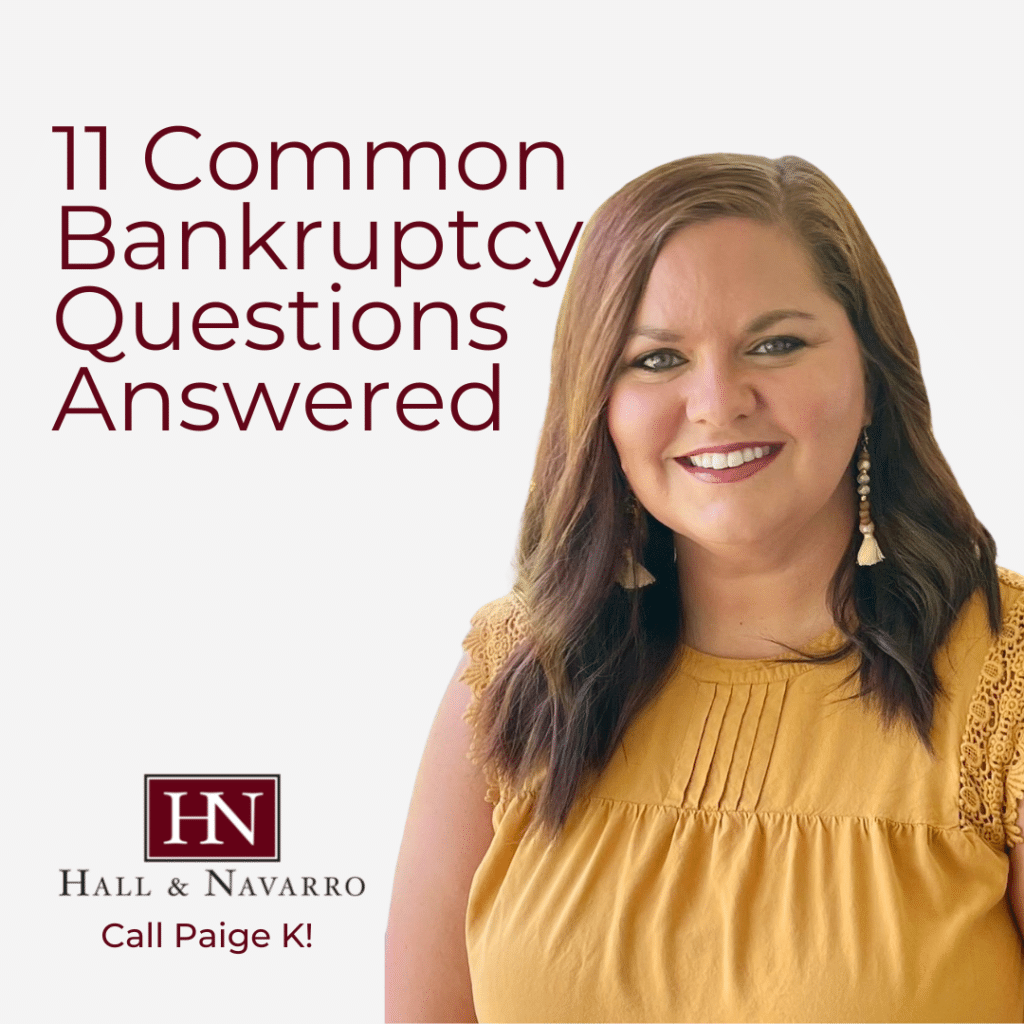I’m Paige Kicklighter, the bankruptcy paralegal at Hall & Navarro. I have over 10 years of bankruptcy paralegal experience, and of course have been asked a lot of questions. Below are the 11 most common bankruptcy questions, answered.
1. When is Chapter 7 bankruptcy a good option?
This may be a good option when you do not have equity in property, you make low or middle-class income, and the majority of your debts are unsecured (credit cards, medical bills, signature loans, etc.).
2. When is Chapter 13 bankruptcy a good option?
Chapter 13 may be a good fit if you are trying to stop a repossession or foreclosure. Once you are officially in bankruptcy, your car cannot be repossessed and the foreclosure of your home will cease. Your vehicle will then be paid through your case as well as your mortgage arrearage.
Chapter 13 may also be a good option if you have non-exempt equity in property that you are wanting to keep, and if you make too much money based on your state’s median income threshold.
3. Will I lose my car or home when I file for bankruptcy?
Typically not. If you qualify for a Ch. 7, you want to make sure you are current on your secured debts such as your vehicle and home. This is so you are able to enter into a reaffirmation agreement with your creditors and keep your asset. You would continue to pay for your secured debts outside of a Chapter 7 bankruptcy typically based on the original contract. If you have non-exempt equity in property such as vehicles or real estate, you could lose them if the Chapter 7 Trustee finds it best to liquidate your assets in order to pay your creditors.
Under a Ch. 13, you may also keep your vehicles and home, however, if you are trying to keep assets that are not necessary (like multiple vehicles, RVs, motorcycles, etc.) or you have non-exempt equity in your assets, you have to pay the same amount of debt to your unsecured creditors that you are paying to keep that property or match the non-exempt equity. In most cases, you will continue to pay for your home outside of the bankruptcy. You will keep your home unless you default on your payments and your creditors are granted relief from stay in which case they could move forward with foreclosure.
4. Will bankruptcy stop garnishments or lawsuits?
Yes. Both a Chapter 7 and Chapter 13 bankruptcy will stop garnishments and lawsuits. Also, once you are under bankruptcy protection, your creditors can no longer try to sue you or garnish you during or after your bankruptcy, unless a “relief from stay” is granted.
5. Can back child support and taxes be included in bankruptcy?
Yes. Under a Chapter 13, any back child support or other types of domestic support obligations may be paid. You do have to make sure that you stay current on your ongoing domestic support obligations. This is a requirement in order to receive your final discharge at the end of your case.
Both Federal and State taxes can be paid back through a Chapter 13 bankruptcy under most circumstances. There are some types of taxes that are not dischargeable, such as sale tax. There are also times when certain taxes are completely dischargeable. You should seek advice from our attorneys to determine if your tax debt is dischargeable.
6. How long does each bankruptcy last?
A typical Chapter 7 bankruptcy lasts approximately 6 months. A Chapter 13 bankruptcy may last 3 – 5 years.
7. How much will my Chapter 13 bankruptcy payment be?
This depends on a few things:
- What secured debts you are paying back,
- Any non-exempt equity you may have in your assets, and
- How much disposable income you have in your budget.
8. Do I have to list all my creditors, or can I pick and choose who I want to include?
When filing for bankruptcy, you must include everyone that you owe money to. This also includes friends and family members whom you owe money to. You can get into a lot of trouble if you try to omit creditors from your case.
9. Do I have to have a certain amount of debt to qualify for bankruptcy?
No. With that being said, if you have minimal debts there may be a certain chapter that is a better fit for you. If you owe very little money, you should seek advice from one of our bankruptcy attorneys.
10. Do I have to include my spouse’s income even if they are not filing?
Yes. If you and your spouse maintain and live in the same household and are not legally separated or divorced, then you are required to include your spouse’s income. If your spouse is not joint on any of the debt with you, then they are not affected by your bankruptcy even by having their income included in your case. Additionally, you also have to have a list of what your spouse pays on their debts and how much total is owed. You will be required to list this in your budget since they will continue to pay their debts like normal.
Other income that you are also required to include is: child support, food stamps, social security, VA benefits, side-job income (even if it is cash income), business income, family contributions, etc.
11. I have a co-signer on one of my debts. Will they be affected?
Possibly. Typically, when you are under a Chapter 13 bankruptcy and are paying back a secured debt back that you have a co-signer on, it maybe suggested to pay the debt in full at the original contract rate. If a debt is not paid in full per the original contract, then the co-signer may be held liable for any remaining balance. Whatever debt is still left owed after the completion of your case may have to be paid in order for the co-signer to be cleared. The account for which you have a co-signer may also be shown on their credit report as being included in bankruptcy. This could possibly affect their credit.
Answering Your Bankruptcy Questions
I really hope these answers help you or someone you know. If you think bankruptcy may be an option for you, fill out our bankruptcy evaluation form, and our team will give you a call to set up a free consultation. It’s time to get started on finding the relief that you need and deserve!



